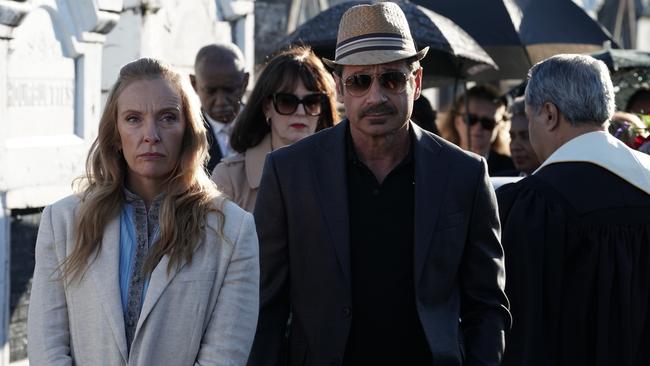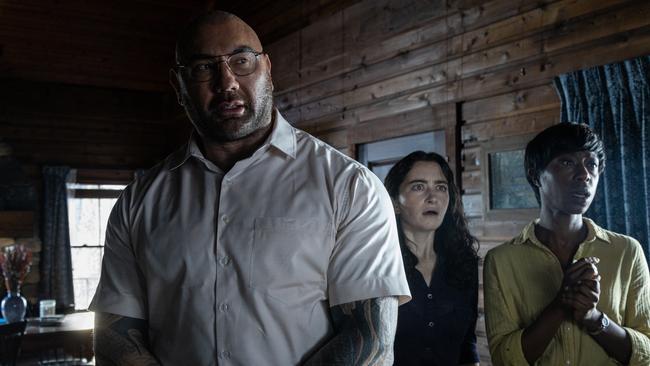The Estate, Toni Collette and David Duchovny dig for gold
It’s shocking just how far they’ll go to squeeze a dime out of the dying aunt they hate in this risque black comedy.

The Estate (MA15+)
Amazon Prime
★★★
The risque black comedy The Estate stars Australia’s Toni Collette alongside an American cast that includes Anna Faris, Rosemarie DeWitt, David Duchovny and the formidable Kathleen Turner.
How risque and how black? A fair dollop of each but perhaps more of the former. If writer-director Dean Craig aims to shock, what we hear suggested and what we then see on screen more than delivers on that intention.
“Let’s get f***ing rich from that dying old bitch,’’ says Savanna (Faris), who is flighty and fond of the f-word. She’s speaking to her sister Macey (Collette), who is more grounded and swears less.
The DOB is Aunt Hilda (Turner), who is wealthy and nasty. She has terminal cancer, no children, no present or past spouse and does not like animals.
She lives alone in a southern mansion. The location is not identified but this film was shot in Louisiana and that looks about right. Her estate is worth north of $US20m.
Savanna and Macey, struggling to pay their bills, come up with a plan: go see their estranged aunt, suck up to her and finagle their way into her will.
The first problem is that their aunt despises them. When they arrive at her sick bed she tells them to help her with her bag as “it’s about to burst all over the place”. She does not mean one with a Gucci label.
The second problem is that their loathed cousins Beatrice (DeWitt) and Richard (Duchovny) have the same idea of cashing in on the DOB. Beatrice drags along her chef husband James (Ron Livingston).
So we have four blood relatives doing whatever it takes to win the favour of an aunt they do not like. She feels the same about them. It’s the outsider, Ron, who sums up the situation as a “family circus of insanity”.
The director is English and this is his second feature, following the 2020 rom-com Love Wedding Repeat. The script is sharp, bordering on satirical, and the over-the-top performances fit this approach.
Beatrice behaves like Lady Macbeth. Richard, who tells everyone to call him Dick (“I prefer Dick”) resembles an ageing porn star. He has had the hots for Macey since their childhood days.
Just how far the four of them are prepared to go, especially after Aunt Hilda, on a morphine drip, complains she’ll “never feel a man inside me again”, certainly ups the shock value.
The opening song on the soundtrack is Tommy Ridgley singing I Want Some Money Baby: “They say money is the root of all evil/ Well, I guess I’m just an evil guy.”
Just how evil these guys (and girls) are is a question they will have to ask each other, and themselves, as the plot unfolds, with some decent twists and turns, over the next 95 minutes in this brazenly funny adults-only movie.
Knock at the Cabin (M)
In cinemas
★★★★
The tightrope tense thriller Knock at the Cabin is M Night Shyamalan’s best film since The Sixth Sense (1999), for which he received an Oscar nomination.
The plot is of two minds, a bit like James McAvoy’s Kevin Wendell Crumb in Split and Glass, the second and third films in the director’s compelling Unbreakable trilogy.
It may be an end-of-the-world horror show or it may be a deranged home-invasion drama. Shyamalan brilliantly keeps the tension of each possibility alive throughout this 100-minute movie, most of which unfolds in close quarters.
The performances are strong, especially from Dave Bautista. This man mountain ex-wrestler is turning into a fine actor. He is also terrific in the Knives Out sequel, Glass Onion, now on Netflix.
We first meet him in a field, towering over a child. He has words tattooed on his hands. It is effortlessly creepy, reminiscent of Robert Mitchum in Charles Laughton’s 1955 classic The Night of the Hunter. Here and elsewhere the use of close-ups is particularly effective, which is a credit to the director and cinematographer Jarin Blaschke, who was Oscar nominated for the 2019 film The Lighthouse.
The first plot possibility, the human annihilation one, is an extreme example of the philosophical thought experiment known as the trolley problem. In short, if you are driving a train that is about to mow down five people and can divert it to a different track where it will kill only one person, what do you do?
In this case, the numbers are much higher and far more personal. It elevates seeing dead people, as Haley Joel Osment does in The Sixth Sense, to a new level.
Leonard (Bautista), Sabrina (Nikki Amuka-Bird), Redmond (Rupert Grint) and Adriane (Abby Quinn) break into a holiday cabin in Pennsylvania.

This movie is drawn from Paul G Tremblay’s 2018 novel The Cabin at the End of the World. The uninvited guests do knock first, as the film title suggests.
Inside the cabin are Eric (Jonathan Groff), Andrew (Ben Aldridge) and their eight-year-old daughter Wen (Kristen Cui). When Wen meets Leonard in the field, before he knocks and then smashes into the cabin, she tells him she has two daddies.
Leonard and co carry medieval-looking weapons but they are apologetic and polite. They introduce themselves like newcomers to an AA meeting. Bespectacled Leonard is a schoolteacher, Sabrina a nurse, Redmond works for a gas company and Adriane is a cook.
“We are normal people just like you,’’ Leonard says. “We have no choice.” Andrew replies that everyone has a choice, and Leonard accepts that is true.
When Leonard announces why they are there it’s a point from which there can be no return. They may not have arrived on horseback but “the four of us are here to prevent the apocalypse”.
Each of them have had the same vision of how the world will end and it involves a lot of fire and screaming. The only way the doomsday clock can be halted is if this family – Eric, Andrew and Wen – agree to sacrifice one of their number and do the killing themselves. Leonard assures them they will not be killed otherwise.
If they refuse to make the sacrifice it will be apocalypse now. The family will survive and the rest of humanity will perish. Three versus seven billion: it is the ultimate trolley problem.
The second plot possibility is that Leonard leads a gang of psychopathic homophobes who have chosen this holiday cabin because they knew Eric and Andrew would be in it.
There are flashbacks to the emotional and physical violence this gay couple has faced, one of which may be a link to one of the four people holding them hostage.
Andrew, who has a temper, thinks this is the case. He also has a gun in his car. Eric is less convinced. (In one of the few funny moments of the film, one flashback sees Jonathon Groff, known for Broadway musicals including Hamilton, singing … well I won’t spoil it).
When Leonard turns on the television to show the news bulletins, what we see is happening, including in Sydney Harbour, is scarily possible. However, is this real news or is it fake news, as Andrew suspects.
Whether it’s plot one or two, or a combination of each, or neither, is something worth waiting for. The twists along the way to the climactic decision – sacrifice or not? – are far from ordinary. This is a thought-provoking, white-knuckle movie for our times.




To join the conversation, please log in. Don't have an account? Register
Join the conversation, you are commenting as Logout